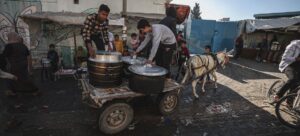[wzslider autoplay=”true”]
Mills are empty, abandoned, and generations of young people mostly do not even know how they look and what their purpose is.
Unlike many of them, after graduating from university and years spent in line at the Employment Service, Emir Zjajo from Donji Vakuf decided to launch an initiative with the support of his wife and ensure existence of his family.
“I put the mill into operation two months ago. The reason why I decided to put an old mill into operation is the lack of employment, which is a common problem for youth in Bosnia and Herzegovina,” said Emir, transportation and communications engineer.
“The mill is located in our yard and is owned by our family for years. Since the demand for organic and eco food increased lately, I saw a chance to fill the family budget in this way. In fact, I decided to try to achieve something independently, without waiting for anyone else to help me,” said Zjajo, who registered this activity two weeks ago, as an independent craft workshop “Hadžija’s Mill”.
The mill, or better known as Hadžija’s mill among the locals, has a long-year tradition. It was built before the Second World War and it played an important role in feeding people then.
“The mill was completely devastated in the past war. After the war, my wife’s grandfather renovated the mill and put it into operation again. It was functioning until 2009, when her grandfather passed away. After that, the mill was not working until two months ago, when I decided to put it into operation again,” said Emir.
The mill’s capacity is not large, since it has only one working stone.
“In 24 hours it can grind some 50 kilograms of wheat, 80-90 kilograms of corn and 30 kilograms of buckwheat. In the spring I intend to expand the mill’s capacity and place another stone,” said Emir.
Also, this young couple intends to plant buckwheat on two dunams of land.
“People can buy all sorts of flour here – buckwheat, corn, wheat, barley and rye. I do not charge money for grinding of grains. Instead, I take my share – I take one kilogram of flour per 10 kilograms I grind,” said Emir.
This year they also planted some raspberries and their first harvest is due next year.
“We decided to plant raspberries like the majority of locals here did. Good price and secured purchase are a guarantee of good income. There is a lot of work with raspberries, as well as a lot of starting investments, but it all pays off eventually,” Emir concluded.
(Source: radiosarajevo.ba)


















